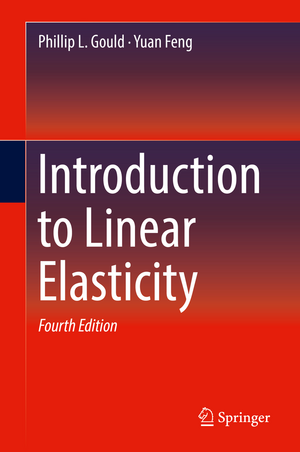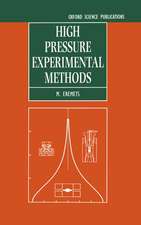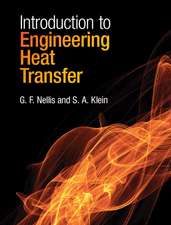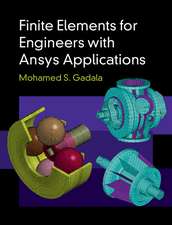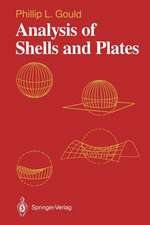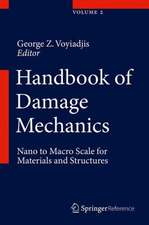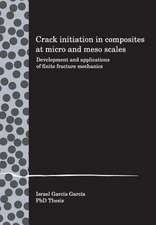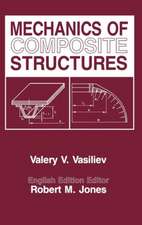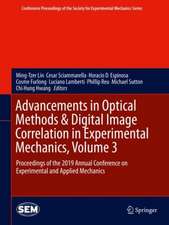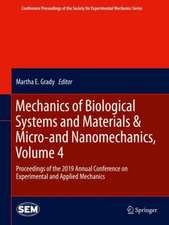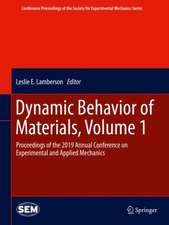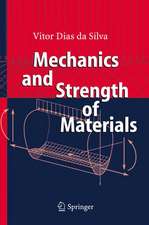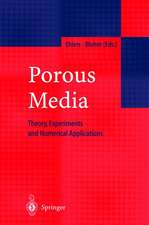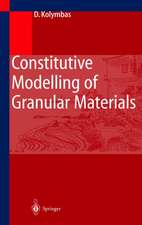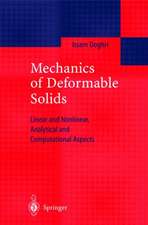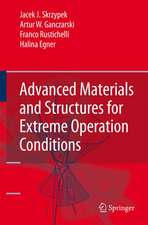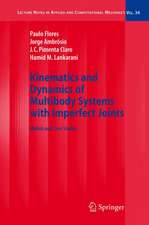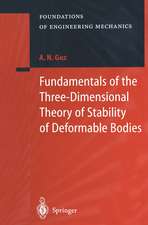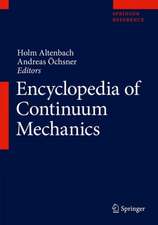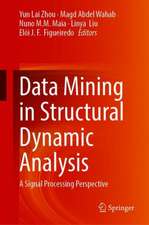Introduction to Linear Elasticity
Autor Phillip L. Gould, Yuan Fengen Limba Engleză Hardback – 2 aug 2018
| Toate formatele și edițiile | Preț | Express |
|---|---|---|
| Paperback (1) | 589.33 lei 6-8 săpt. | |
| Springer International Publishing – 2 feb 2019 | 589.33 lei 6-8 săpt. | |
| Hardback (1) | 738.06 lei 6-8 săpt. | |
| Springer International Publishing – 2 aug 2018 | 738.06 lei 6-8 săpt. |
Preț: 738.06 lei
Preț vechi: 900.07 lei
-18% Nou
Puncte Express: 1107
Preț estimativ în valută:
141.22€ • 147.85$ • 116.86£
141.22€ • 147.85$ • 116.86£
Carte tipărită la comandă
Livrare economică 05-19 aprilie
Preluare comenzi: 021 569.72.76
Specificații
ISBN-13: 9783319738840
ISBN-10: 3319738844
Pagini: 369
Ilustrații: XX, 384 p. 207 illus., 88 illus. in color.
Dimensiuni: 155 x 235 x 31 mm
Greutate: 0.74 kg
Ediția:4th ed. 2018
Editura: Springer International Publishing
Colecția Springer
Locul publicării:Cham, Switzerland
ISBN-10: 3319738844
Pagini: 369
Ilustrații: XX, 384 p. 207 illus., 88 illus. in color.
Dimensiuni: 155 x 235 x 31 mm
Greutate: 0.74 kg
Ediția:4th ed. 2018
Editura: Springer International Publishing
Colecția Springer
Locul publicării:Cham, Switzerland
Cuprins
Introduction and Mathematical Preliminaries.- Traction, Stress and Equilibrium.- Deformations.- Material Behavior.- Formulations, Uniqueness and Solutions Strategies.- Extension, Bending and Torsion.- Two-Dimensional Elasticity.- Thin Plates and Shells.- Dynamic Effects.- Viscoelasticity.- Energy Principles.- Strength and Failure Criteria.- Something New.
Notă biografică
Dr. Phillip L. Gould was the Harold D. Jolley Professor of Civil Engineering from 1981 until 2010 and is now a Senior Professor at Washington University in St.Louis. His research activities have centered on shell analysis with applications to finite element modeling, biomedical engineering, earthquake engineering, and the structural design of thin-shell structures. Dr. Gould is the author of numerous papers and several books and is the founding editor of the prestigious journal, Engineering Structures. He has served as a consultant to industry and to governmental organizations and has received numerous awards for his research, professional and educational activities.
Dr. Yuan Feng is Associate Professor within the School of Biomedical Engineering, Shanghai Jiao Tong University, Shanghai, China.
Dr. Yuan Feng is Associate Professor within the School of Biomedical Engineering, Shanghai Jiao Tong University, Shanghai, China.
Textul de pe ultima copertă
This augmented and updated fourth edition introduces a new complement of computational tools and examples for each chapter and continues to provide a grounding in the tensor-based theory of elasticity for students in mechanical, civil, aeronautical and biomedical engineering and materials and earth science. Professor Gould’s proven approach allows faculty to introduce this subject early on in an educational program, where students are able to understand and apply the basic notions of mechanics to stress analysis and move on to advanced work in continuum mechanics, plasticity, plate and shell theory, composite materials and finite element mechanics. With the introductory material on the use of MATLAB, students can apply this modern computational tool to solve classic elasticity problems. The detailed solutions of example problems using both analytical derivations and computational tools helps student to grasp the essence of elasticity and practical skills of applying the basic mechanics theorem.
- Features a new suite of computational tools and examples in each chapter;
- Maximizes student learning by combining the basics of continuum mechanics and linear elasticity;
- Introduces the powerful computational tool (MATLAB) with applications for solving elasticity problems;
- Reinforces concepts presented with rich problems sets with step-by step solutions;
- Presents a mix of tensor, explicit, and indicial notations that provide students with the basics for further study of continuum mechanics and other advanced level mechanics courses.
Caracteristici
Features a new suite of computational tools and examples in each chapter; Maximizes student learning by combining the basics of continuum mechanics and linear elasticity; Introduces the powerful computational tool (MATLAB) with applications for solving elasticity problems; Reinforces concepts presented with rich problems sets with step-by step solutions; Presents a mix of tensor, explicit, and indicial notations that provide students with the basics for further study of continuum; mechanics and other advanced level mechanics courses.
